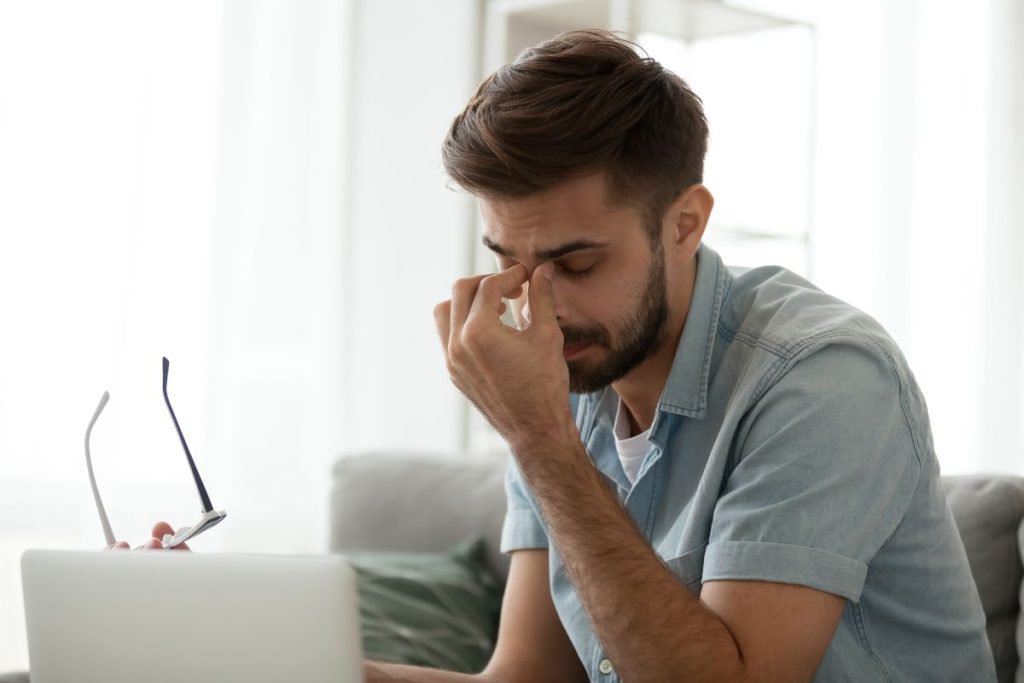The human eye is a very complicated organ. Dry eyes are caused by insufficient lubrication of the eyes.
In that case, your eyes may feel gritty, and visual acuity can be reduced to some extent. Dry eyes can be uncomfortable and painful in certain cases, but can dry eyes cause blurry vision?
The blurriness reported by the majority of dry eye patients is mostly due to the discomfort of dry eyes themselves.
Persons with dry eyes often complain of tear film instability and fluctuating vision as well. Through this article, we’ll take a closer look at the relationship between dry eyes and blurry vision.
What Is a Blurry Vision?
Blurry vision is a condition that occurs when the eyes are unable to focus properly on an image. This can happen for a variety of reasons, but one common cause is dry eyes.
The symptoms associated with blurry vision vary depending on the cause, but they usually include:
- Difficulty seeing objects close up or far away
- Sensitivity to light
- Double or multiple images
- Aching or burning sensation in the eyes
- Watery eyes
Why does dry eye cause blurred vision? Dry eyes can cause blurry vision for many reasons.
First, dry eye is caused by a lack of tear production or by tear quality. This results in a feeling of dryness in the eye and may lead to symptoms like blurred vision, stinging, itching, burning, or even discharge from the eye.
In addition to these symptoms, dry eyes can also cause problems with your vision.
For example, if you have dry eyes and are looking at something far away, your eyes will work harder than normal to keep that object in focus. This extra effort can cause fatigue and blurriness.
What is Dry Eye Syndrome?
Dry Eye Syndrome is a common condition that affects the eyes and the tear film that covers the surface of your eye. The tear film helps lubricate and protect the surface of your eyes.

It contains three layers: the outermost layer that keeps tears from evaporating too quickly; an oily middle layer that helps prevent evaporation; and a watery inner layer that keeps tears from evaporating too quickly. When these layers are disrupted, dry eyes can occur.
What Causes Dry Eyes?
There are many causes of dry eyes including aging and hormonal changes in women during menopause or pregnancy.
Many people experience seasonal allergies and they may also experience dry eye symptoms when they are exposed to allergens such as pollen or grasses.
Dry eyes can also be caused by medications such as antihistamines, antidepressants, blood pressure medications, allergy medications, and even some beauty products such as eyelash curlers, mascara, and makeup removers.
Dry Eye Symptoms
What does dry eye look like?
Dry eyes are a very common problem, especially as we age. Dry eye symptoms can be difficult to diagnose because they often mimic other problems. Here are some common symptoms of dry eyes:
- Your eyes feel scratchy or gritty when you wake up in the morning or after being outside on a windy day.
- You experience burning sensations in your eyes when they're exposed to wind or air conditioning during winter months (or even indoors).
- Your eyes are constantly tearing up or watering—even when there's nothing around them causing irritation (like computer screens or bright lights).
Dry Eye Treatment
What are the ways on how to treat dry eyes?
The first step in treating dry eyes is to make sure you are getting enough sleep, as lack of sleep causes your body to produce less tears. There are a few more different ways to treat dry eyes:
- Use over-the-counter (OTC) eye drops. These drops relieve redness and inflammation by increasing the number of tears in your eyes.

They also help replace the nutrients your tears normally provide so that your eyes stay healthy. If you have mild symptoms, try using an OTC drop every four to six hours. If the drops don't work well enough, talk with your doctor about prescription-strength drops or other treatments.
- Use a humidifier to help keep the air moist in your home or office space. This will help prevent dry air from causing further irritation or discomfort for you or others who spend time there regularly, such as children or pets.
- Keep your eyelids lubricated with a thin layer of petroleum jelly applied twice daily—once in the morning before leaving for work or school.
- Wear goggles or glasses to protect your eyes from wind, dust and smoke.
- Avoid activities that can irritate your eyes (such as swimming)
- Have your eyelids checked for any problems that may be causing them to become dry
How To Prevent Dry Eyes and Blurry Vision
Dry eyes can be an uncomfortable and frustrating condition, but they're also one of the most common eye problems. If you experience dry eyes on a regular basis, it can make it difficult to see clearly and do your best work.
Fortunately, there are some simple ways to prevent dry eyes and blurry vision. Here's how:
1. Use Eye Drops Regularly
Whether you need prescription medication or over-the-counter drops, using these regularly will keep your eyes moist and reduce your risk of developing dry eye symptoms.
2. Keep Your Hands off Your Eyes!
This is especially important if you wear contacts because touching your eyes can spread bacteria that cause infection and irritation.
Instead, use a clean cloth to gently wipe away debris from your eyelids before putting on your contacts or glasses each day.
3. Maintain a Humid Environment
Keep your environment humidified by running a humidifier in your home or office during cold weather months (November through March) when heating systems tend to dry out the air around us more than usual.

This will help keep moisture levels at healthy levels for both sinuses (which line our nasal passages) as well as our skin cells which line all surfaces of our bodies).
4. Blink More Often
Another way to prevent dry eyes and blurry vision is by blinking more often when you are reading or watching television. If you wear glasses, make sure that they fit well so that they do not slip off your face easily.
You should also avoid wearing contact lenses for extended periods of time because they can irritate your eyes as well; try wearing them only when necessary instead of all day long.
When Is Blurred Vision a Serious Issue?
If you have blurry vision in one or both eyes, it's important to see your doctor immediately so they can determine what the cause is and treat it. If you notice any of the following symptoms, call your doctor immediately:
- Pain in the eye(s)
- Double vision
- Swelling or redness around the eye(s)
- A discharge from your eye(s) that looks like pus or blood
Blurring the Lines: Answers to Frequently Asked Questions
How Will My Eye Doctor Check for Dry Eye?
Your eye doctor will use a few different tests to check for dry eye.
First, they'll check your tear production. They might do this by putting a special dye in your eyes and looking at it under a microscope, or they might just have you press on the bridge of your nose while they look at your eyes through a slit lamp.

If that test doesn't show any problems with tear production, then they'll look for signs of irritation.
This can be done with a small piece of tape that sticks to your eyelid for about 30 seconds—if it leaves behind an imprint when removed, then you're probably experiencing some irritation.
Finally, if everything looks normal so far and you still have blurry vision, then your doctor will likely want to examine your cornea (the clear part at the front of your eye).
They'll probably do this with a special light called an ophthalmoscope or by using drops that dilate the pupils so that they can see better into the back of your eyes.
What Long-term Complications Develop From Dry Eyes?
The most common long-term complication of dry eyes is corneal damage. This can occur when the cornea (the clear window at the front of your eye) becomes too dry and begins to crack or peel away from its underlying layers.
If this happens, you may notice a small bubble or bump on your cornea that eventually turns into a scar.
Dry eye syndrome can also lead to more serious complications like conjunctivitis (pink eye), which causes inflammation and redness in your eyelids and surrounding skin areas; blepharitis (inflammation) in your eyelashes; and glaucoma (increased pressure in your eyeball).
These conditions require treatment by a doctor who specializes in treating these disorders such as an ophthalmologist (eye doctor).
Why Are Tears So Important for Healthy Eyes?
We all know that tears are important for healthy eyes, but why?
Tears serve many purposes. They help lubricate the eye, flush away foreign particles and irritants, and keep your eyes from drying out. But did you know that tears also play a role in protecting your vision?
Your eyes are filled with sensitive cells called corneal epithelial cells that help to keep your vision sharp. These cells are constantly regenerating themselves, but they can’t do it without tears. Tears contain proteins called growth factors that promote cell development and healing in the cornea.
When you don’t produce enough tears or if you produce too much mucus, these growth factors become diluted and don’t work as well as they should. This can lead to blurry vision or even blindness over time!
Can Dry Eyes Cause Blindness?
NO. Dry eyes can cause blurry vision, but it's not the same thing as blindness.
Blurry vision is a symptom of dry eyes. You may notice that when your eyes are dry, you can't see as clearly as usual.

Your vision may seem hazy or foggy, or you might notice that everything looks like it has a halo around it. Because these symptoms aren't related to damage to your retina (which is what causes blindness), they're not a cause of blindness.
However, if your dry eye symptoms persist and get worse over time, you should talk to your doctor about them.
In some cases, chronic dry eye can lead to inflammation and cell damage in your corneas, which could eventually cause blindness if left untreated.
Can Eye Drops Cause Blurry Vision?
NO. Dry eyes can cause blurry vision, but it's not because of the eye drops.
The most common cause of blurry vision is dry eyes. Dry eyes occur when your eyes don't produce enough tears to protect and lubricate the eye surface. When this happens, your cornea—the clear part of your eye that lets you see—can become dry and irritated.
Conclusion
Dry eyes and blurry vision can be two of the many uncomfortable symptoms of dry eye syndrome. By learning about the possible causes of blurry vision, you can start to control how your eyes feel.
There are things that you can do to try to address this condition, you only need to immediately communicate this with your doctors (much safer than trying to get treatment through your own research), and clarify how to improve your vision and overall health.

